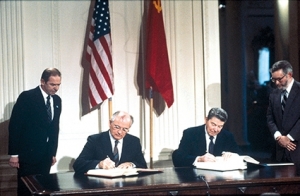The Iconic INF Treaty is in Danger
On October 22, the US President Donald Trump’s national security adviser, John Bolton began his travel across the former Soviet space first by visiting Russia, with plans to visit all three South Caucasus countries thereafter.
The visit comes amid tensions between Washington and Moscow. Although mutual distrust is nothing new, and we know that tensions have already been existent for several years, Bolton’s visit is still notable of how deep Russia-US relations have plunged.
Before the visit, the US media reported that Bolton will travel to Moscow specifically to warn the Russian President, Vladimir Putin, that the US intends to leave the treaty.
Concern about the INF (The Intermediate-Range Nuclear Forces) Treaty’s future has existed for some time. In 2014, the Obama administration accused Moscow of violating the treaty by carrying out intensive works on a prohibited ground-launched cruise missile of intermediate range. Ever since, the US officials have insisted that the Russians have developed a new medium-range missile called the Novator 9M729 (commonly known in the West as SSC-8).
In a lengthy nuclear strategy document published early this year, the administration detailed the Russian violations and concluded that the country’s “decision to violate the INF Treaty and other commitments all clearly indicate that Russia has rebuffed repeated US efforts to reduce the salience, role and number of nuclear weapons.”
Washington contended that Moscow has deployed prohibited tactical nuclear weapons to intimidate European nations and former Soviet states that have aligned with the West. Still, Obama decided not to leave the agreement because of major concerns from the Europeans and out of general fear that it would serve as a renewal of a Cold-War era arms race.
Defense Secretary Jim Mattis has publicly discussed alleged Russian violations several times in recent weeks, saying the Trump administration is currently reviewing its options.
The destruction of the INF Treaty will be an important development with far-reaching consequences on the world. The treaty was signed in 1987 between the two great Cold War period powers to ban all land-based missiles with ranges of 500 to 5,500 km. Such missiles are known as short- and intermediate-range. The treaty covers land-based missiles carrying both nuclear and conventional warheads.
One of the geopolitical reasons behind the US leaving the INF Treaty is that the document has constrained Washington from deploying new weapons to respond to rising threats to US interests around the globe. The Americans specifically have their eyes on China and its efforts to cement a dominant position in the Pacific and to keep American naval forces at bay. Since the INF Treaty is only between the two states, China, a non-signatory to the treaty, has had no limits on developing intermediate-range nuclear missiles. In other words, the question is how the decision to leave the treaty will accelerate the Cold War-style military contest among the US, Russia and China.
If the US pulls out of the agreement, the decision will likely prove problematic with its European allies and others elsewhere. Many an analyst thinks that the withdrawal from the treaty will create problems for Washington too, as the country currently has no missile that can be promptly deployed to counter the Russians’ military successes.
Also, even if the US military successfully manages to produce such a missile, it is not yet clear where the US would station it. The intermediate-range missile class cannot reach Russia from the US, and as such it would need to be placed in Eurasia, near the Russian borders. It is likely that Washington will have troubles persuading its close allies to allow a deployment of this kind of arms on their territories.
Bolton’s visit will clarify the issues related to the INF Treaty, but it is nevertheless clear the demise of the document is highly likely. Mikhail Gorbachev, the Soviet leader who signed the treaty together with his US counterpart, has already come out with harsh criticism against efforts to dismantle the regulations. On a higher geopolitical level, it seems that the US withdrawal from the treaty is a side-effect of China’s rise and the US efforts to curb it.
By Emil Avdaliani
The signing of the INF Treaty by then-US President Ronald Reagan and Soviet leader Mikhail Gorbachev in Washington, 1987. Image source: nato.int











